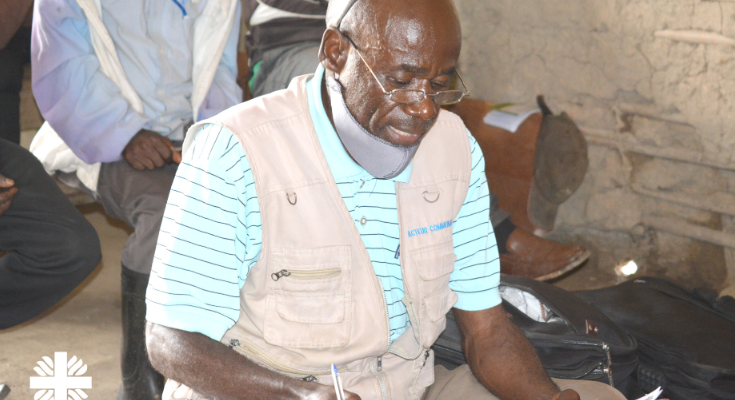Displaced communities get by thanks to support from local organizations in DR Congo
DRC | 2022 | CBPF
Democratic Republic of Congo, Lolwa. People in the Democratic Republic of Congo (DRC) have suffered through a complex crisis driven by chronic violence, sexual violence and grave violations against children that has now lasted decades. Across the country, 26.4 million people – or one Congolese in four – are severely food insecure. And 5.7 million people are internally displaced, the highest number on the African continent. Millions of people seek safety and security away from their homes.
Noe, 59 and a father of six, fled his village because of militia fighting. He found refuge in Lolwa, Ituri province, where he is president of the displaced persons camp, elected by the other families living there and by the host community.
Caritas Bunia, a Congolese organization, provided cash transfers to 2,250 displaced people and local families in Lolwa, with the support of the DRC Humanitarian Fund in 2022. This was the first assistance received in Lolwa, where the project estimated some 7,000 households were seriously affected by the crisis. With cash transfers, people can purchase the basics they need. As Noe notes, “Today, each household has been able to buy the household items of their choice.”
Household supplies for families
Clementine is a young mother of five. She and her family fled violence in late December 2022, arriving at Rusayo IDP camp with very little. “We fled with only our clothes. When we arrived at Rusayo, we were given space for a small hut. When it rained, water leaked.” The family gathered what basic items they could from neighbours.
With support from the DRC Humanitarian Fund (DRC HF), local Congolese NGO RACOJ is assisting around 22,000 displaced families with shelter and household supplies. Clementine and her husband received the basics like blankets, tarpaulins, cooking pots and utensils. “One of the things we needed most was better shelter and basic household items. These items will help us a lot.”
Over 45 per cent of DRC HF funding went to Congolese organizations in 2022, putting localization at the heart of its mission. Local organizations are often the best placed to understand the needs of their communities and are accepted as partners offering help.
Clementine hopes to return home. “This is not a way of life, and it hurts me to be dependent on assistance for survival today. We used to live a better life before. I wish to return home, but we will only do so once it is safe.”
OCHA – POOLED FUNDS DATA HUB – By Country (unocha.org)
